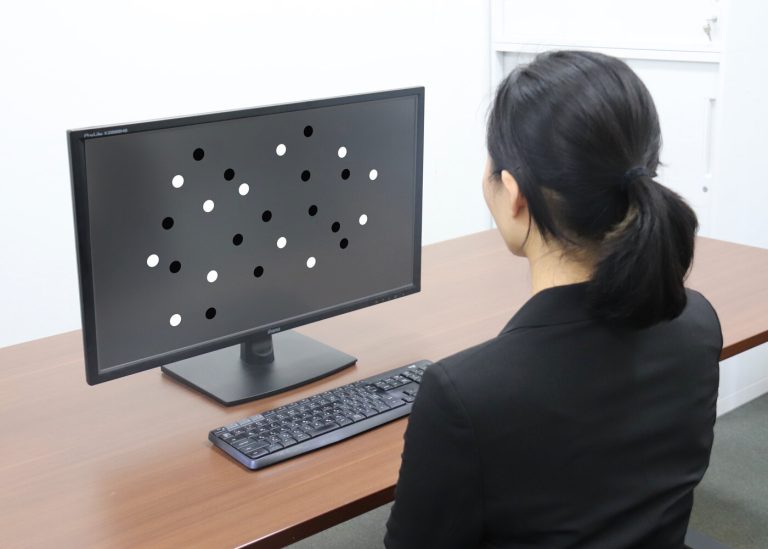The participant estimates the number of dots that appear on the screen. Credit: Osaka Metropolitan University
× Close
The participant estimates the number of dots that appear on the screen. Credit: Osaka Metropolitan University
Does past experience bias a person in his future assessments? Yes, say researchers at Osaka Metropolitan University in Japan, but only if a person has higher processing abilities through responding, rather than just observing.
They arrived at their findings through experiments involving participants who estimated the number of dots flashing on a screen. Participants either had to enter their estimates before making another estimate for a new set of points or were not asked to do anything but observe. The researchers found that those who were asked to respond showed serial dependence.
“What we see or hear is influenced by what we have seen or heard before,” said Professor Shogo Makioka of the Graduate School of Sustainable System Sciences at Osaka Metropolitan University. “The way we are influenced depends on the stimulus and the time interval. If we are influenced by what came before, meaning we are biased toward believing that separate items are more similar, we call that sequential dependence.”
The results were published in Scientific reports.
In the first experiment in this paper, 35 participants were shown dots for a quarter of a second and then asked to provide their estimated answer to the number before being shown another set of dots. Later, the same participants were shown points but were not asked to provide an answer, before being shown another set of points and again asked to estimate.
In the second experiment, 23 participants were randomly asked to provide an answer. The researchers found that participants who were asked to respond were more likely to provide an answer that was closer to their last remark.
“Experiments have shown that the serial dependence effect is strongest immediately after a response request,” said co-author Yukihiro Morimoto, a third-year doctoral student at the university. “This is an important finding when considering how to provide information to prevent human error.”
However, the researchers note that they did not find a relationship between serial dependence and accuracy, likely because the number of dots was random, rather than in intentional groups or patterns.
According to Professor Makioka, the stronger post-response serial dependence is due to the higher processing the participant must use to notice and estimate the number of dots, and then translate that into an answer.
“We are now investigating whether number-related serial dependence also occurs in children and whether it occurs when numbers are presented through sound,” Professor Makioka said. “With these studies, we aim to provide clearer guidelines for preventing human error by revealing in detail the ways in which sequential dependence arises and how number-related processes work.”
more information:
Yukihiro Morimoto et al., Response enhances serial dependence in a number estimation task. Scientific reports (2024). doi: 10.1038/s41598-024-52470-0
Magazine information:
Scientific reports

